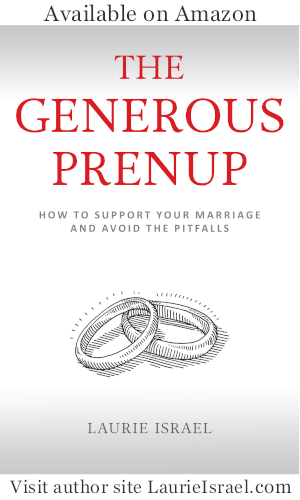by Laurie Israel, Esq.
Article Categories
It seems to be becoming more and more fashionable to have a prenuptial agreement. I get calls from people in their early 20s, with no assets, asking for one. Last week I got a call from a very excited young man who asked me to prepare one. I asked him when the marriage was occurring. He said “tomorrow”. I declined the assignment.
![]()
Prenuptial agreements are not lollypops. They are extremely serious agreements that can cut deeply into the financial rights and obligations of a marriage. Money, finances and security are a very important element of marriage. Therefore, I have always been very wary about drafting prenuptial agreements. Here are some of my reasons and how I attempt to balance competing interests of legitimate needs of clients and potential damage to the marriage.

With personalized legal counseling, I often find out that the client may have ideas about prenuptial agreements gleaned from a media article that “pushes” them. Or the client has heard from friends who went through a “bad divorce” that this is the only solution to have a “safe” marriage.
As a lawyer, I seek to do no harm to my clients, only to help them. I view being a lawyer as a helping profession. I always try to go beyond the technical, asking open-ended questions to find out if there are any issues affecting the work that my client and I will do together. Often these open-ended questions reveal important facts and circumstances that bear very strongly on the work that we do.
When approached about drafting a prenuptial agreement, many lawyers go into technical mode. A standard prenuptial agreement is drafted and presented, without thinking about the effect it will have on both parties and the marriage. Giving a client an off-the-shelf standard prenuptial agreement may not be acting in the client’s best interest.
When a potential prenuptial agreement client comes into my office, I spend a great deal of time talking with him or her to find out the basis of why they feel they need a prenuptial agreement. If my client is the party whose rights will be limited by the prenuptial agreement, I have a long talk with him/her (usually her), and the talk usually ends with tears — not mine.
Giving the client options and explaining the effects of actions taken (i.e., embarking upon negotiations towards a prenuptial agreement, or entering into one) is an important part of legal counseling. In my experience, clients do not generally recognize the downsides of having a prenuptial agreement, and the detrimental effect it could have on their marriage. On many occasions that after the initial consult, the client realizes after understanding the implications of a prenuptial agreement that there is no compelling reason for it, and that he/she would prefer not to have one.
My sense of prenuptial agreements is that they can be extremely hurtful to a relationship, ironically, just at the exact point at which the relationship becomes a “marriage”. This can play out in a number of ways. The two most prevalent examples are stringent prenuptial agreements initiated by the parents of one of the spouses, or restrictive prenuptial agreements for young people marrying for a first time. The other prevalent (and egregious) scenario is a prenuptial agreement initiated by the wealthier spouse close to the wedding after all wedding plans have been made and invitations sent out.
A potential spouse asking for a prenuptial agreement from the other party is basically saying, several things. One is that “I don’t trust you to be fair”. Then there’s “We’re getting married, but we’re not sharing everything, especially the financial protections of marriage.” Another is “We’re getting married, but I’m not entirely on board with this marriage, and I think there’s a good chance we’re getting a divorce”. And there’s “I don’t trust the divorce laws to be fair, and I think you’re going to take advantage of me and we will have a nasty divorce.”
These are pretty ugly thoughts and not the stuff of which beautiful weddings are made. In my experience (with a less moneyed spouse), the negotiations can often cause an irreparable tear in the fabric of the betrothed couple’s relationship right at the beginning of the marriage. In other words, it is my belief that having a prenuptial agreement, in many cases, makes it more likely (perhaps much more likely) that a divorce will ultimately occur. Put another way, by reducing the risk, the gain (of having a lifetime marriage) is also reduced.
Think about it: at the outset of the relationship, the parties to the prenuptial agreement have discussed their divorce and established terms for the divorce. The taboo of not divorcing has been breached. Moreover, the parties have now entered the marital relationship in a spirit of distrust.
Whatever happened to “for better and for worse”, and the line “with all I am and all I have to give” in the wedding ceremony? Isn’t sharing of income and assets part of the glue that keeps the marriage joint venture together?
This is not to say that in some instances a prenuptial agreement is very important. In fact, at times, a prenuptial agreement may be crucial for the marriage to be successful.
The most typical of these scenarios is the second marriage, later in life, of two people who have children from the first marriage. These people will generally have strong financial loyalties to their respective children. They will also want to financially protect their new spouse. A prenuptial agreement can sometimes be very helpful in balancing these aims before the wedding, and may allow the couple to remove from their marriage a very potentially destructive conflict.
Because of my concern about hurting a marriage, I try to tread very lightly in cases in which I draft a prenuptial agreement on behalf of a client. I try to draft the restrictive terms in as limited manner as possible, while still providing whatever protection is needed.
There may be disappearing provisions, based on the length of the marriage. There may be “sunset” provision, in which the prenuptial agreement will self-destruct at a certain point in time. There might be provisions that are more generous and create a more “blended” marriage as time goes on and the marriage proves successful. There may be differing provisions depending on whether the couple has children together. The prenuptial agreement does not need to foreclose alimony, in spite of the common “scorched earth” draft that seems to be circulated among attorneys. Sometimes waivers of alimony can be very unfair as the years go by. The prenuptial agreement could just affect a limited issue, such as parental inheritances or one particular premarital asset.
The prenuptial agreement should take into account death as well as divorce. (This is an element that is missed in many off-the-shelf prenuptial agreements.) This is to ensure that a party’s death benefits, if the marriage is intact, are not less than his/her divorce terms. If this issue is not addressed, a disparity could exist and hurt the surviving spouse in an intact marriage.
If I am engaged in working with a client on a prenuptial agreement, I try to do all these things well before the wedding date, so that the negotiations can be processed in the most thoughtful, kind way.
In many cases, having the prenuptial agreement negotiated under the collaborative law process can be very productive in helping the parties addressing the issues in a constructive and not-hurtful way. In the collaborative law process, each of the parties will be working with a collaboratively-trained lawyer and the negotiations will be done in a series of four-way, face-to-face meetings. For more information, search “collaborative law” on the internet. A couple may also see a mediator to work out the terms of a prenuptial agreement. It is strongly advisable that the terms be reviewed (and perhaps fine-tuned) by separate lawyers representing each of the parties in that case.
So, there are many things to contemplate when thinking about having a prenuptial agreement. It is very important for a couple to seriously consider the impact and potential terms prior to proceeding.
Copyright ©2007 Laurie Israel.
